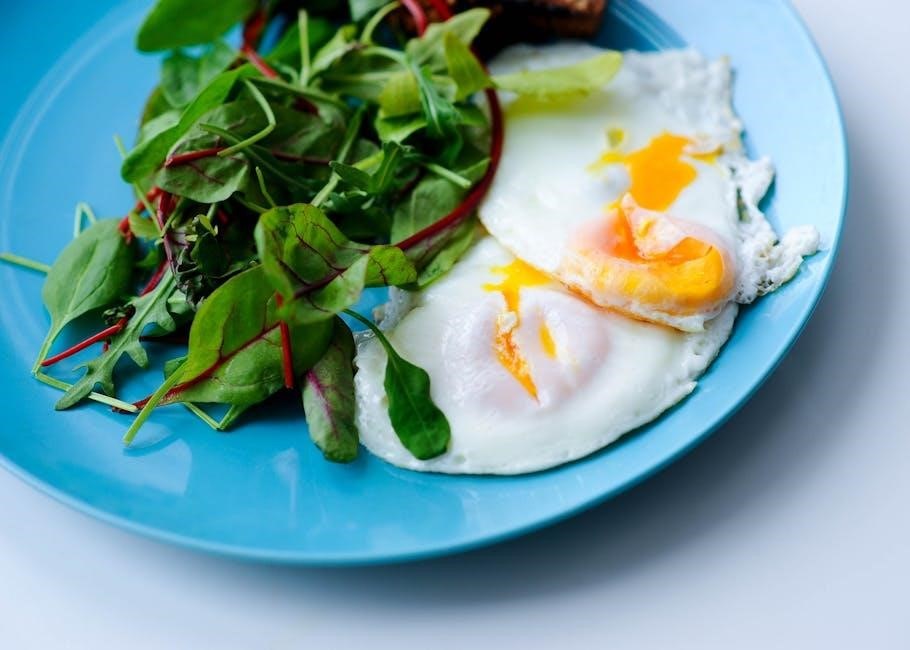200g protein meal plan pdf
A 200g protein meal plan is designed to support muscle growth, weight management, and overall health. It provides structured nutrition for high-protein diets, catering to various preferences and goals.
Overview of the Importance of High-Protein Diets
High-protein diets are essential for muscle repair, growth, and maintenance. They help increase satiety, supporting weight management by reducing overall calorie intake. Protein is vital for building and repairing tissues, making it a cornerstone of fitness and health. A diet rich in protein can improve muscle recovery after workouts, enhance metabolic function, and support immune health. For those aiming to lose weight or gain lean muscle, high-protein diets are particularly effective. Additionally, protein helps maintain muscle mass during calorie restriction, ensuring a healthier weight loss process. Incorporating sufficient protein into meals is crucial for overall nutritional balance and long-term health benefits.
Understanding the Role of Protein in Muscle Growth and Weight Management
Protein is a cornerstone of muscle growth and weight management. It provides essential amino acids that stimulate muscle protein synthesis, repairing and building muscle tissue. Adequate protein intake supports lean muscle mass, which is vital for a healthy metabolism. During weight loss, protein helps preserve muscle, preventing metabolic slowdown. For athletes and active individuals, consuming sufficient protein accelerates recovery and enhances performance. A high-protein diet also promotes satiety, reducing overall calorie intake and supporting sustainable weight management. By prioritizing protein-rich foods, individuals can maintain muscle integrity while achieving their weight and fitness goals, ensuring a balanced and effective approach to overall health.
Benefits of a 200g Protein Meal Plan
A 200g protein meal plan supports muscle growth, aids in weight management, and enhances overall health by providing sufficient amino acids for tissue repair and metabolic functions.
Supporting Muscle Recovery and Growth
A 200g protein meal plan is essential for muscle recovery and growth, as it provides ample amino acids to repair and build muscle tissue. Protein is vital for athletes and individuals engaging in regular physical activity, as muscles require consistent replenishment. Consuming 200g of protein daily ensures that muscle fibers are adequately repaired after workouts, promoting hypertrophy and strength gains. This intake also supports muscle synthesis, helping to maintain or increase muscle mass. Incorporating lean proteins like chicken, fish, and plant-based options, along with supplements, can help meet this goal. Consistency in protein intake is key to maximizing recovery and growth, making a structured meal plan indispensable for those aiming to build or maintain muscle.
Helping with Weight Loss and Maintenance
A 200g protein meal plan can significantly aid in weight loss and maintenance by boosting metabolism and enhancing satiety. Protein requires more energy to digest, increasing calorie burn. It also helps preserve muscle mass during calorie restriction, ensuring weight loss comes from fat, not muscle. With higher protein intake, cravings for unhealthy snacks often decrease, leading to better dietary adherence. Additionally, protein-rich meals promote a feeling of fullness, reducing overall calorie consumption. This structured approach ensures a balance of nutrients, supporting sustainable weight management. By combining high-protein foods with low-calorie, nutrient-dense options, individuals can achieve their weight goals while maintaining energy and vitality. This plan is particularly effective for those seeking long-term, healthy weight management.
Improving Overall Nutritional Balance
A 200g protein meal plan enhances nutritional balance by ensuring adequate intake of essential nutrients. High-protein diets often include a variety of whole foods like lean meats, fish, eggs, dairy, legumes, and whole grains, which provide vitamins, minerals, and fiber. This balanced approach supports overall health by reducing the risk of nutrient deficiencies. The plan encourages the inclusion of vegetables, fruits, and healthy fats, promoting a well-rounded diet. By focusing on whole, unprocessed foods, it helps maintain energy levels, supports immune function, and optimizes bodily functions. This structured meal plan ensures that protein intake is complemented by other vital nutrients, fostering a holistic approach to nutrition and long-term health benefits. It is designed to be sustainable and adaptable to individual dietary needs.
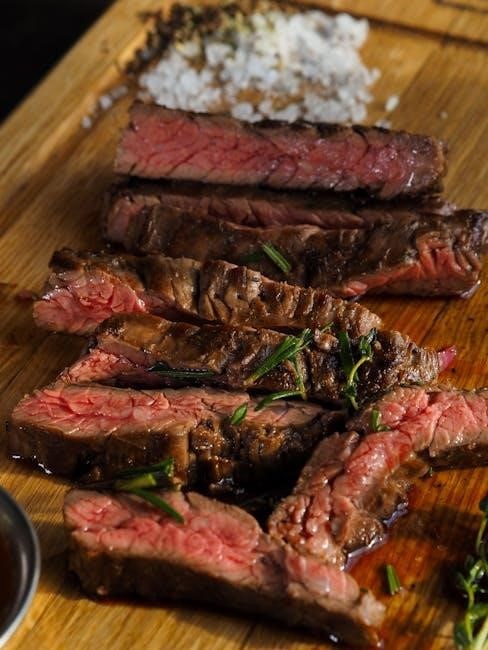
Meal Plan Options for Achieving 200g of Protein
A 200g protein meal plan provides flexible options for various dietary needs, including vegetarian and non-vegetarian choices, ensuring balanced nutrition and high protein intake daily.
Vegetarian Meal Plan for 200g Protein
A vegetarian meal plan for 200g of protein focuses on plant-based sources like legumes, nuts, seeds, and whole grains. Greek yogurt with berries and nuts provides a protein-rich breakfast, while lentils, chickpeas, or tofu can be incorporated into lunches and dinners. Snacks like peanut butter and fruits add extra protein. Quinoa, edamame, and tempeh are excellent options for balancing meals. This plan ensures variety, with recipes like veggie stir-fries, hummus wraps, and protein-packed smoothies. By combining these foods thoughtfully, vegetarians can easily meet their daily protein goals without compromising on flavor or nutrition.
Non-Vegetarian Meal Plan for 200g Protein
A non-vegetarian meal plan for 200g of protein incorporates lean meats, fish, eggs, and dairy. Breakfast options include eggs, Greek yogurt, or cottage cheese. Lunches can feature grilled chicken, turkey, or tuna, paired with vegetables. Dinners might include salmon, steak, or pork, along with complex carbs like quinoa or sweet potatoes. Snacks like protein shakes or hard-boiled eggs help meet daily goals. This plan emphasizes variety, ensuring balanced nutrition while focusing on animal-based protein sources to achieve the desired intake efficiently.
Low-Calorie vs; High-Calorie Meal Plans
Low-calorie and high-calorie meal plans differ in their macronutrient distribution while maintaining 200g of protein. Low-calorie plans focus on lean proteins, vegetables, and minimal carbs, ideal for weight loss. High-calorie plans include larger portions, healthy fats, and complex carbs, suitable for muscle gain. Both emphasize whole foods and balanced nutrition, with meal prepping and tracking recommended for consistency. Adjusting portion sizes and food choices allows customization to meet individual goals, whether fat loss or muscle growth, ensuring the protein target is consistently achieved.
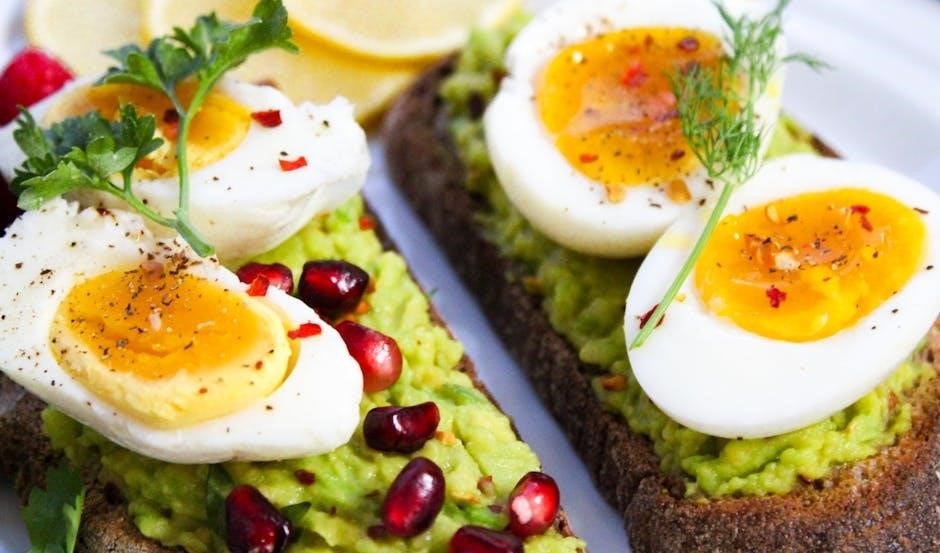
Key Food Sources for High Protein Intake
Essential high-protein foods include lean meats, fish, eggs, dairy, legumes, nuts, seeds, and whole grains. These sources provide the necessary building blocks for achieving 200g of protein daily.
Animal-Based Protein Sources (Eggs, Meat, Dairy)
Animal-based proteins are rich in essential amino acids, ideal for muscle growth and repair. Eggs, lean meats like chicken and turkey, fatty fish such as salmon, and dairy products like Greek yogurt and cottage cheese are excellent sources. A 200g protein meal plan often includes these foods due to their high protein content and bioavailability. For instance, a single egg provides about 6g of protein, while a 100g serving of chicken breast offers approximately 31g. Incorporating these into meals ensures a balanced intake, supporting muscle synthesis and overall nutritional needs. These foods are versatile and can be prepared in various ways to maintain dietary variety and satisfaction.
Plant-Based Protein Sources (Legumes, Nuts, Seeds)
Plant-based proteins are vital for a balanced diet, offering abundant amino acids and nutrients. Legumes like lentils, chickpeas, and black beans are high in protein, with lentils providing about 9g per 100g serving. Nuts and seeds, such as almonds, chia seeds, and hemp seeds, are also excellent sources, with almonds offering 21g of protein per 100g. These foods are versatile and can be incorporated into meals like salads, stir-fries, or smoothies. For vegetarians aiming for 200g of protein, combining legumes, nuts, and seeds ensures a diverse and nutrient-rich intake. They are also rich in fiber and healthy fats, making them a sustainable choice for overall wellness and muscle maintenance.
Supplements and Protein Powders
Supplements and protein powders are invaluable for meeting the 200g protein goal, especially for those with high demands or busy schedules. Whey protein isolate and casein protein are popular choices, offering 25g of protein per scoop. Plant-based options like pea and rice protein are excellent for vegetarians, providing 20g per serving. Collagen peptides and egg protein powders are also versatile, supporting muscle repair and growth. These supplements can be easily incorporated into smoothies, oatmeal, or yogurt, boosting protein intake efficiently. For convenience, they are widely available in flavors and unflavored forms, making them adaptable to various diets. Consulting with a healthcare professional ensures safe and personalized use, optimizing results for muscle gain and overall health. They are a practical solution for achieving daily protein targets without sacrificing taste or convenience.
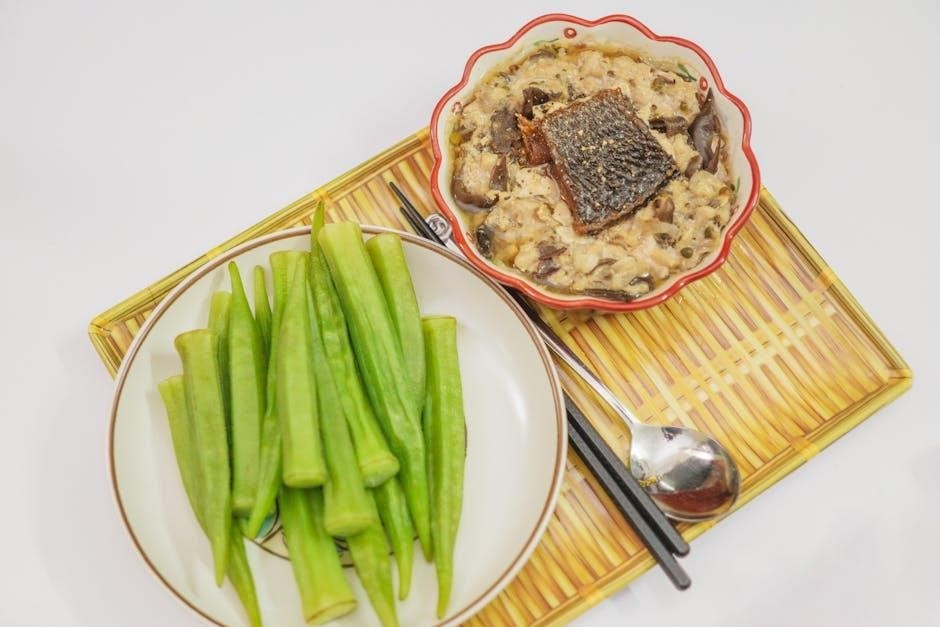
Sample Meal Plans with Over 200g Protein
Discover high-protein meal plans exceeding 200g, featuring balanced recipes like Greek yogurt with nuts, grilled chicken, and quinoa bowls, tailored for both vegetarians and meat-eaters.
Breakfast Ideas (High-Protein Recipes)
Start your day with protein-packed breakfasts to meet your 200g goal. Greek yogurt with berries and nuts offers 15g of protein. Eggs are a versatile option—scrambled, fried, or boiled. Protein smoothies with whey powder, spinach, and almond milk are quick and nutritious. Avocado toast topped with poached eggs adds healthy fats and protein. For vegetarians, tofu scramble with chickpeas and quinoa provides a hearty start. Cottage cheese with pineapple or peaches is another high-protein choice. Incorporate these recipes into your meal plan to ensure a strong foundation for your daily protein intake.
Lunch Ideas (Balanced and Nutritious Options)
For lunch, incorporate balanced meals rich in protein and nutrients. Grilled chicken breast with quinoa and mixed vegetables provides lean protein and fiber. Tuna salad with avocado and whole-grain toast is another hearty option. Baked salmon with sweet potatoes and steamed broccoli offers omega-3s and complex carbs. Vegetarian choices like lentil soup with whole-grain bread or chickpea salads are also effective. Aim for meals that combine protein with healthy fats and carbs to keep you energized. These options ensure you stay on track with your 200g protein goal while maintaining a balanced diet.
Dinner Ideas (Lean Proteins and Complex Carbs)
Dinner is a great opportunity to refuel with lean proteins and complex carbs. Grilled chicken breast with roasted vegetables and quinoa is a balanced option, providing 50g of protein. Baked salmon with sweet potato mash and green beans combines omega-3s with fiber-rich carbs. Turkey meatballs over whole-grain pasta offer a hearty, protein-packed meal. For vegetarians, tofu stir-fries with brown rice and mixed vegetables are an excellent choice. Each meal should aim to include 50-70g of protein, paired with nutrient-dense sides to support overall nutrition and muscle recovery. These dinner ideas help maintain your 200g protein goal while offering variety and satisfaction.
Snack Ideas (Healthy and Protein-Rich Options)
Snacks are essential for maintaining protein intake throughout the day. Greek yogurt with berries and nuts provides 15g of protein and healthy fats. A scoop of whey protein powder mixed with water offers 25g of protein in seconds. Hard-boiled eggs are a convenient option, delivering 6g of protein per egg. Cottage cheese with pineapple chunks is another great choice, offering 20g of protein. For vegetarians, a protein smoothie with spinach, banana, and peanut butter is an excellent option. Beef jerky or mixed nuts also make for quick, protein-packed snacks. These options help you stay on track to meet your 200g protein goal while keeping hunger at bay between meals.
Customizing Your 200g Protein Meal Plan
Customize your 200g protein meal plan by adjusting macronutrients, swapping protein sources like eggs or legumes, and adding variety to suit your preferences and dietary goals.
Adjusting for Caloric Needs
Adjusting your 200g protein meal plan for caloric needs involves balancing protein intake with carbohydrates and fats. For weight loss, opt for lower-calorie options like lean meats and vegetables, while for muscle gain, incorporate calorie-dense foods such as nuts and whole grains. Customize portion sizes based on your daily energy expenditure to ensure you meet your goals without overconsumption. Tracking your macronutrient ratios and meal prepping can help maintain consistency. This approach ensures you achieve your protein targets while aligning with your specific caloric requirements for optimal results.
Swapping Proteins and Carbohydrates
Swapping proteins and carbohydrates in your 200g protein meal plan allows for flexibility and variety. For proteins, you can substitute chicken breast with tofu, beans, or lentils for vegetarian options or opt for fish like salmon or cod for added omega-3 benefits. For carbohydrates, replace brown rice with quinoa, sweet potatoes, or whole-grain pasta, ensuring a balanced intake of complex carbs. This customization helps maintain nutritional diversity while keeping protein intake consistent. Adjust portion sizes to match your caloric needs, ensuring each meal remains balanced and aligned with your fitness or weight management goals. This approach keeps your diet interesting and tailored to your preferences.
Adding Variety to Your Diet
Add variety to your 200g protein meal plan by incorporating diverse protein sources, flavors, and meal types; Include lean meats like chicken or turkey, fish options such as salmon or cod, and plant-based proteins like beans, lentils, or tofu. Experiment with different cuisines, such as Mediterranean, Mexican, or Asian-inspired dishes, to keep meals exciting. Rotate vegetables and whole grains to ensure a broad intake of nutrients. Incorporate snacks like Greek yogurt, nuts, or hard-boiled eggs to meet protein goals while providing variety. This approach prevents dietary monotony and ensures sustained motivation, making it easier to stick to your high-protein regimen for muscle growth and weight management. Variety enhances both enjoyment and adherence to the meal plan.
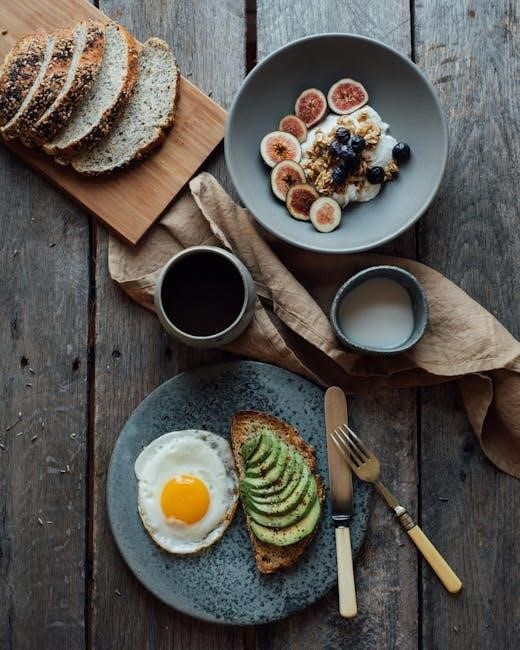
Macronutrient Breakdown in a 200g Protein Meal Plan
A 200g protein meal plan balances carbs, fats, and fiber to support muscle growth and weight management, typically including 150-200g carbs, 60-80g fats, and 25-35g fiber daily.
Carbohydrates and Fiber Intake
In a 200g protein meal plan, carbohydrates and fiber are essential for energy and digestion. Aim for 150-200g of carbs daily, focusing on complex sources like whole grains, fruits, and vegetables. These provide sustained energy and support muscle recovery. Fiber intake should range between 25-35g per day to promote digestive health and satiety. Incorporating foods like oats, quinoa, sweet potatoes, and legumes helps maintain a balanced intake. Additionally, low-glycemic carbs are recommended to prevent spikes in blood sugar levels, ensuring a steady supply of energy throughout the day. Balancing carbs and fiber is crucial for overall nutritional harmony in a high-protein diet.
Healthy Fats and Their Importance
Healthy fats are crucial in a 200g protein meal plan, supporting hormone production and nutrient absorption. Aim for 40-70g of fats daily, focusing on unsaturated sources like avocados, nuts, seeds, and olive oil; These fats enhance meal satisfaction and provide essential fatty acids, such as omega-3s, which support heart health. Including sources like fatty fish, eggs, and flaxseeds ensures a balanced intake. Healthy fats also aid in maintaining skin health and cognitive function. Balancing fats with proteins and carbs is key to achieving overall dietary harmony and supporting fitness goals. They add flavor and variety, making meals more enjoyable while providing vital nutrients.
Maintaining a Balanced Diet
Maintaining a balanced diet alongside a 200g protein intake ensures overall nutritional harmony. Pair high-protein foods with complex carbs like whole grains, quinoa, and vegetables, which provide sustained energy. Incorporate healthy fats from sources like avocados, nuts, and olive oil to support heart health and satiety. Include a variety of colorful vegetables and fruits to boost vitamin and mineral intake. Adequate hydration is also essential for protein absorption and bodily functions. Balancing macronutrients and micronutrients ensures optimal health, energy levels, and physical performance. A well-rounded diet supports muscle recovery, weight management, and long-term wellness, making it easier to stick to your protein goals sustainably.
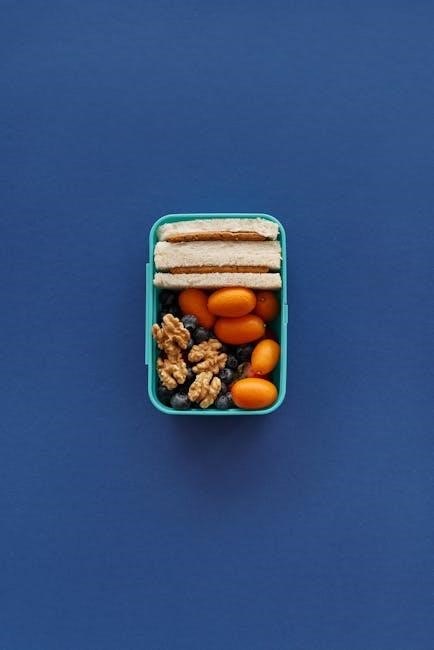
Downloading and Using the 200g Protein Meal Plan PDF
Download a pre-made 200g protein meal plan PDF, featuring customizable templates for breakfast, lunch, and dinner. Print and organize your plan for easy tracking and consistency.
Where to Find Reliable Meal Plan Templates
Reliable 200g protein meal plan templates can be found online through fitness websites, health blogs, and nutrition platforms. Websites like Rzone Fitness and Australian Eggs offer downloadable PDFs with high-protein recipes and structured meal plans. These templates are often customizable, allowing users to adjust based on dietary preferences and caloric needs. Additionally, platforms like Google Docs and PDF repositories provide free templates that can be tailored to include over 200g of protein per day. These resources ensure that users can access organized and nutritious meal plans designed by experts, making it easier to achieve their protein goals without the hassle of meal planning from scratch.
How to Customize the PDF for Personal Use
To customize a 200g protein meal plan PDF for personal use, start by adjusting the macronutrient ratios to suit your goals. Swap protein sources, such as replacing chicken with fish or tofu, to add variety. Incorporate your favorite foods while ensuring each meal meets the protein target. Use tools like Adobe Acrobat or online editors to modify the template. For example, increase or decrease portion sizes based on caloric needs, or add notes for meal prepping. You can also integrate supplements, like protein powders, to boost intake. Ensure the plan aligns with your lifestyle by adjusting cooking methods or ingredient availability. This personalization makes the meal plan sustainable and tailored to your preferences, ensuring consistency and adherence to your protein goals. Regularly review and update the plan to maintain motivation and track progress effectively.
Printing and Organizing Your Meal Plan
Once you’ve downloaded the 200g protein meal plan PDF, print it on standard paper or cardstock for durability. Organize the pages in a binder or folder for easy access. Consider adding page protectors to safeguard against spills or wear. Highlight key meals or tips for quick reference. You can also add sticky notes for reminders or substitutions. For convenience, print a shopping list from the plan and attach it to the front. Keep the binder in the kitchen or take it with you for meal prepping. This organized approach ensures you stay on track and can easily revisit the plan for future use. A well-structured and accessible meal plan enhances adherence and makes achieving your protein goals more manageable.
Additional Tips for Success
Stay hydrated to aid protein absorption, and prep meals in advance to maintain consistency. Track your progress and adjust the plan as needed for optimal results and sustainability.
Hydration and Its Role in Protein Absorption
Proper hydration is crucial for optimal protein absorption. Water aids in digesting protein-rich foods, transporting nutrients, and preventing bloating. Aim for at least 8-10 glasses daily to support muscle recovery and overall health.
Meal Prepping for Consistency
Meal prepping is essential for maintaining consistency in a 200g protein meal plan. Preparing meals in advance ensures adherence to your dietary goals, saves time, and reduces the likelihood of unhealthy choices. By organizing your meals for the week, you can efficiently balance protein intake, portion control, and nutrient variety. This approach also helps in managing calories and macros, making it easier to track progress and adjust as needed. Incorporating meal prep into your routine supports long-term success and sustainability of your high-protein diet.
Tracking Progress and Adjustments
Tracking your progress is crucial for achieving and maintaining a 200g protein meal plan. Use a food diary or mobile app to monitor daily protein intake, caloric consumption, and macronutrient balance. Regularly assess your weight, body fat percentage, and muscle growth to evaluate your progress. Adjust your meal plan as needed by modifying portion sizes or swapping protein sources to stay on track. Incorporate weekly check-ins to ensure you’re meeting your goals and make necessary tweaks to your diet. Tracking also helps identify patterns and areas for improvement, ensuring long-term success and optimal results from your high-protein diet.

